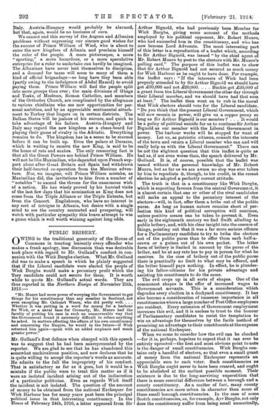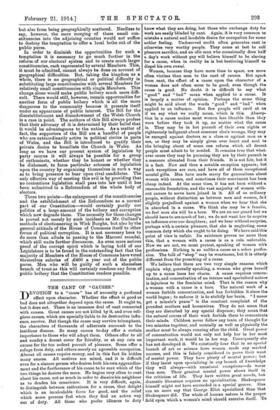PUBLIC BRIBERY.
OWING to the traditional generosity of the House of Commons in treating leniently every offender who makes a frank apology, less discussion than was desirable took place with regard to Mr. Gulland's conduct in con- nexion with the Wick Burghs election. What Mr. Gulland did was to make a speech in which he plainly suggested that if the Liberal candidate were elected the people of Wick Burghs would make a pecuniary profit which the Tory candidate could not secure for them. It is worth while to quote Mr. Gulland's actual words. They are thus reported in the Northern Ensign of November 25th, 1913 "Mr. Munro had more power of worrying the Government to get things for his constituency than any member in Scotland, not even excepting Mr. Cathcart Wason, who did pretty well. . . . Whether it was putting in a word for money for a harbour for Wick, or a naval base for Cromarty, Mr. Munro had the faculty of putting his case in such an unanswerable way that the Government found it extremely difficult to refuse anything be asked. In matters affecting the affairs of his own constituency and concerning the Empire, he would in the future—if Wick returned him again—speak with an added emphasis and much greater power."
Mr. Gulland's first defence when charged with this speech was to suggest that he bad been misrepresented by the reporter. We are glad to see that he has abandoned this somewhat unchivalrous position, and now declares that he is quite willing to accept the reporter's words as accurate. He admits to the full the impropriety of his conduct. That is satisfactory as far as it goes, but it would be a mistake if the public were to treat this matter as if it were an isolated incident arising out of the indiscretion of a particular politician. Even as regards Wick itself the incident is not isolated. The question of the amount of money to be obtained from the national Exchequer for Wick Harbour has for many years past been the principal political issue in that interesting constituency. In the Times of February 24th, 1910, a letter appeared from Sir Arthur Bignold, who had previously been Member for Wick Burghs, giving some account of the methods employed by his political opponent, Mr. Robert Munro, who had succeeded him in the constituency, and who has now become Lord Advocate. The most interesting part of this letter is a reproduction of a leaflet which, according to Sir Arthur Bignold, was issued "by the chief agent of Mr. Robert Munro by post to the electors with Mr. Munro's polling card." The purpose of this leaflet was to show that Sir Arthur Bignold had not secured as much money for Wick Harbour as he ought to have done. For example, the leaflet says : "If the interests of Wick had been properly attended to by Sir Arthur Bignold we should have got £80,000 and not .220,000. . . . Buckie got £30,000 of a grant from the Liberal Government the other day through their Liberal member, and we should have had thatsum at least." The leaflet then went on to rub in the moral that Wick electors should vote for the Liberal candidate. "Do you think that the present Liberal Government, which will now remain in power, will give us a copper penny so long as Sir Arthur Bignold is our member ? . . . It would be a policy of political suicide for us to continue Sir Arthur Bignold as our member with the Liberal Government in power. The harbour works will be stopped for want of money. Let us, as patriotic citizens, consult the interests of the town and return a Liberal member who can and will really help us with the Liberal Government." There can be not the slightest question that this leaflet is quite as bad as, if not even worse than, the speech delivered by Mr. Gulland. It is, of course, possible that the leaflet was issued without the personal knowledge of Mr. Robert Munro, but as far as we are aware no step was ever taken by him to repudiate it, though, to his credit, in the recent election he adopted a perfectly correct attitude.
The truth is that in a constituency like Wick Burghs, which is expecting favours from the central Government, it is almost certain that one or other of the rival candidates will make an appeal to the pecuniary interest of the electors—will, in fact, offer them a bribe out of the publie purse. As long as human nature remains short of per- fection this kind of political corruption will continue. unless positive means can be taken to prevent it. Even early in the eighteenth century we find Swift alluding to public bribery, and, with his clear insight into the essence of things, pointing out that it was a far more serious offence for a Parliamentary candidate to try to bribe the electors out of the public purse than to offer them each half-a- crown or a guinea out of his own pocket. The latter form of bribery is limited in amount by the purse of the briber, and he at any rate has to pay in person for what he receives. In the case of bribery out of the public purse there is practically no limit to what may be offered, and the briber himself pays nothing. In effect, he is plunder- ing his fellow-citizens for his private advantage and assisting his constituents to do the same. The evil crops up in all sorts of shapes. One of the commonest shapes is the offer of increased wages to Government servants. This is a consideration which degrades every election in a dockyard constituency. It has also become a consideration of immense importance in all constituencies where a large number of Post Office employees are resident Every extension of Government employment increases this evil, and it is useless to trust to the honour of Parliamentary candidates to resist the temptation to win an advantage for themselves by the facile method of promising an advantage to their constituents at the expense of the national Exchequer. When we come to consider how the evil can be checked —for it is, perhaps, hopeless to expect that it can ever be entirely uprooted—the first and most obvious point to note is the danger of small constituencies. Wick Burghs con- tains only a handful of electors, so that even a small grant of money from the national Exchequer represents an appreciable sum to each voter. Such constituencies as Wick Burghs ought never to have been created, and ought to be abolished at the earliest possible moment. Their existence is due to the long-surviving superstition that there is some essential difference between a borough and a county constituency. As a matter of fact, many county constituencies are more urban in character than some of these small borough constituencies. In the case of some Scotch constituencies, as, for example, Ayr Burghs, not only does the constituency suffer from being small numerically,-
but also from being geographically scattered. Needless to say, however, the mere merging of these small con- stituencies into the adjoining counties would not suffice to destroy the temptation to offer a local bribe out of the public purse.
In order to diminish the opportunities for such a temptation it is necessary to go much further in the reform of our electoral system and to create much larger constituencies, each represented by several Members. This, it must be admitted, cannot always be done on account of geographical difficulties. But, taking the kingdom as a whole, there is no geographical or political difficulty in substituting large constituencies with several Members for relatively small constituencies with single Members. This change alone would make public bribery much more diffi- cult. There would still, however, remain opportunities for another form of public bribery which is all the more dangerous to the community because it presents itself under an appearance of public interest. The Bill for the disestablishment and disendowment of the Welsh Church is a case in point. The authors of this Bill always profess that their advocacy of it is determined by their belief that it would be advantageous to the nation. As a matter of fact, the supporters of the Bill are a handful of people who are extraordinarily active in political circles in parts of Wales, and the Bill is introduced to gratify their private desire to humiliate the Church in Wales. As long as we have our present system of legislation by party caucus it will always be possible for a group of enthusiasts, whether they be honest or whether they be dishonest, to force particular schemes of legislation upon the country by organizing themselves in such a way as to bring pressure to bear upon rival candidates. The only effective way of meeting this evil is by providing that no contentious legislation shall pass into law until it has been submitted to a Referendum of the whole body of electors.
These two points—the enlargement of the constituencies and the establishment of the Referendum as a normal part of our Constitution—would certainly purify our politics of a large amount of the bribery and corruption which now degrade them. The necessity for these changes is proved not merely by such incidents as Mr. Gulland's methods of electioneering in Wick Burghs, but also by the general attitude of the House of Commons itself to other forms of political corruption. It is not necessary here to do more than allude in passing to the Marconi scandal, which still waits further discussion. An even more serious proof of the corrupt spirit which is laying hold of our Legislature is to be found in the outstanding fact that the majority of Members of the House of Commons have voted themselves salaries of .2400 a year out of the public purse. Men who will be guilty of such a shameless breach of trust as this will certainly condone any form of public bribery that the Constitution renders possible.















































 Previous page
Previous page